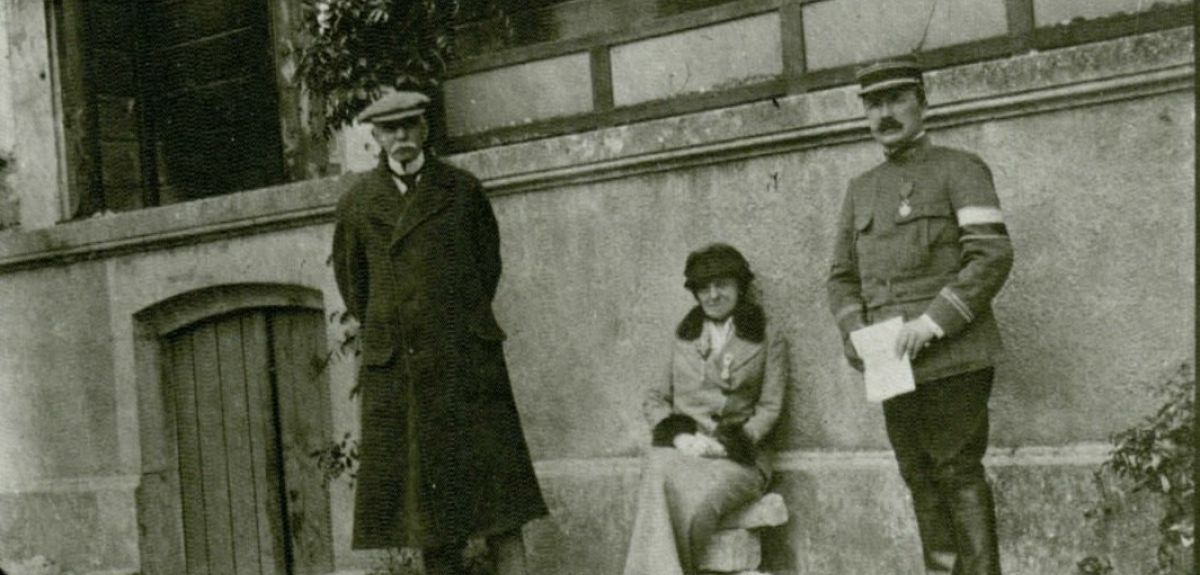
Edith Wharton Collection. Yale Collection of American Literature. Beinecke Rare Book and Manuscript Library. Yale University.
Oxford academic discovers short story draft by Edith Wharton
In Arts Blog we try to cover the latest research findings in the humanities and social sciences. But what about the story behind the research?
Here, Dr Alice Kelly, a Postdoctoral Writing Fellow in the Women in the Humanities Programme in TORCH | The Oxford Centre for the Humanities, explains how she made a recent discovery about Edith Wharton.
Dr Kelly found a typescript of a short story written by the Pulitzer Prize-winning American novelist, short-story writer and three-time Nobel Prize in Literature nominee. Titled 'The Field of Honour', the story is about the First World War.
"It was the title that originally caught my attention: an undated folder of writing marked ‘The Field of Honor’, catalogued between a number of drafts of short stories in the Edith Wharton Collection in the Beinecke Rare Book and Manuscript Library at Yale University.
Initially at Yale on a one-year Fox International Fellowship completing my doctoral dissertation on women’s First World War writing, I stayed on for a further two years, eventually teaching in the English Department and in the History Department of Wesleyan University, a nearby liberal arts college.
Working in the marble-clad Beinecke Library in the Wharton papers was the highlight of my time at Yale, and led to my discovery of this unknown First World War story and its significance in terms of Wharton’s war writings.
In an article published in this week’s issue of the Times Literary Supplement I provide a critical introduction and reproduce the story, which concerns Wharton’s anxieties about women in wartime and the relationship between America and France.
Not many people know that Wharton – the wealthy and globetrotting writer famous for her novels of high society, The House of Mirth (1905), Ethan Frome (1911), The Custom of the Country (1913) and The Age of Innocence (1920) – was also a war worker, reporter and author.
When the war broke out, Edith Wharton was living in Paris and very quickly became involved with relief efforts, establishing and managing four war charities, which would later gain her a number of military honours.
Although her writing slowed down during this period because of her extensive relief work, she still produced a considerable amount of war-related writing: a series of war reports published in American magazines and collected as Fighting France: From Dunkerque to Belfort in 1915; three short stories ‘Coming Home’ (1915), ‘Writing a War Story’ (1919), and ‘The Refugees’ (1919); the 1916 fundraising anthology The Book of the Homeless; and the novels Summer (1917), The Marne (1918) and A Son at the Front (1923), as well as a number of poems, newspaper articles and talks.
The story ‘The Field of Honour’ gives us a further demonstration of Wharton’s imaginative engagement with the war, particularly into the complexities of wartime politics and the role of women.
The story’s title, with ‘honour’ spelt in the English rather than American spelling (which was typical of Wharton) and meaning the battlefield or the field where a duel is fought, was originally a phrase referring to the medieval battleground, which became part of commonplace Great War rhetoric, and eventually represented post-war memorialisation efforts.
For First World War literary and cultural historians, it is impossible to read the phrase without thinking of its numerous wartime iterations. Reading the story for the first time – sitting in the library of the university which awarded Wharton an honorary degree in 1921 – I realized that the story was as rare as I’d originally thought, and gives us a greater insight into Wharton as a war writer.
After the neglect of Wharton’s war writing for a number of years, more recently there has been a critical reassessment taking place. My critical edition of Fighting France, Wharton’s collection of First World War reportage, will be published by Edinburgh University Press for its centenary in December 2015, along with restored original photographs and significant new archival material from Yale and Princeton.
My hope is that editions such as this one will contribute to new scholarship on Wharton’s war writing and the broadening canon of women’s First World War writing.
As a Women in the Humanities Postdoctoral Writing Fellow based at The Oxford Research Centre in the Humanities (TORCH), I am currently working on a broader study of modernist culture and war commemoration, examining the ways that writers, especially women writers, thought and wrote about death during and after the Great War.
I also run a twice-weekly Academic Writing Group for DPhil, postdocs and Early Career Researchers – which I’m sure Wharton, who wrote every morning in bed until noon, would have approved of."